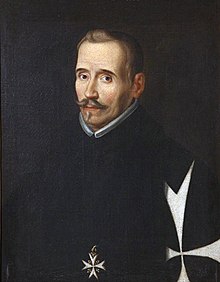
Fuenteovejuna (Spanish: [ˌfwenteoβeˈxuna]) is a play by the Spanish playwright Lope de Vega. First published in Madrid in 1619, as part of Docena Parte de las Comedias de Lope de Vega Carpio (Volume 12 of the Collected plays of Lope de Vega Carpio),[1] the play is believed to have been written between 1612 and 1614.[2] The play is based upon a historical incident that took place in the village of Fuenteovejuna in Castile, in 1476.[1] While under the command of the Order of Calatrava, a commander, Fernán Gómez de Guzmán, mistreated the villagers, who banded together and killed him. When a magistrate sent by King Ferdinand II of Aragon arrived in the village to investigate, the villagers, even under the pain of torture, responded only by saying "Fuenteovejuna did it."